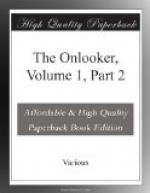—Robert Herrick.
=Tavern Series=
That Smuggled Silk
By the old lobbyist
Should your curiosity invite it, and the more since I promised you the story, we will now, my children, go about the telling of that one operation in underground silk. It is not calculated to foster the pride of an old man to plunge into a relation of dubious doings of his youth. And yet, as I look backward on that one bit of smuggling of which I was guilty, so far as motive was involved, I exonerate myself. I looked on the government, because of the South’s conquest by the North, and that later ruin of myself through the machinations of the Revenue office, as both a political and a personal foe. And I felt, not alone morally free, but was impelled besides in what I deemed a spirit of justice to myself, to wage war against it as best I might. It was on such argument, where the chance proffered, that I sought wealth as a smuggler. I would deplete the government—forage, as it were, on the enemy—thereby to fatten my purse. Of course, as my hair has whitened with the sifting frosts of years, I confess that my sophistries of smuggling seem less and less plausible, while smuggling itself loses whatever of romantic glamour it may have been invested with or what little color of respect to which it might seem able to lay claim.
This tale shall be told in simplest periods. That is as should be; for expression should ever be meek and subjugated when one’s story is the mere story of a cheat. There is scant room in such recital for heroic phrase. Smuggling, and paint it with what genius one may, can be nothing save a skulking, hiding, fear-eaten trade. There is nothing about it of bravery or dash. How therefore, and avoid laughter, may one wax stately in any telling of its ignoble details?
When, following my unfortunate crash in tobacco, I had cleared away the last fragment of the confusion that reigned in my affairs, I was driven to give my nerves a respite and seek a rest. For three months I had been under severest stress. When the funeral was done—for funeral it seemed to me—and my tobacco enterprise and those hopes it had so flattered were forever laid at rest, my nerves sank exhausted and my brain was in a whirl. I could neither think with clearness nor plan with accuracy. Moreover, I was prey to that depression and lack of confidence in myself, which come inevitably as the corollary of utter weariness.
Aware of this personal condition, I put aside thought of any present formulation of a future. I would rest, recover poise, and win back that optimism that belongs with health and youth. This was wisdom; I was jaded beyond belief; and fatigue means dejection, and dejection spells pessimism, and pessimism is never sagacious nor excellent in any of its programmes.
For that rawness of the nerves I speak of, many apply themselves to drink; some rush to drugs; for myself, I take to music. It was midwinter, and grand opera was here. This was fortunate. I buried myself in a box, and opened my very pores to those nerve-healthful harmonies. In a week thereafter I might call myself recovered. My soul was cool, my eye bright, my mind clear and sensibly elate. Life and its promises seemed mightily refreshed.




